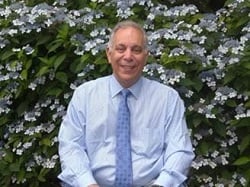Reflections: Transition Through Retirement
How do I prepare for retirement beyond the financial?
By Glenn Mangurian BS, MBA and Joanna Cain, MD
When I turned 50, I started getting direct mail solicitations from AARP. Now I’m sure AARP is a fine organization for old people but not for me. I wasn’t old and I certainly wasn’t thinking of retiring. Call it fear or denial. I just wasn’t emotional prepared to be identified as a senior or retiree.
I was, however, putting money aside for retirement. I have learned that people spend a lot of time preparing their financial portfolio for retirement but don’t think about their psychological portfolios until they actually quit working. Retirement is a “Developmental Life Stage” like marriage, birth of children, adolescence, & leaving home for the first time. Of course, I did those things decades ago. These life stage transitions can't be circumvented...we must adjust and re-orient our lives to incorporate the changes.
Contemplating retirement can cause anxiety. Like me, you likely love your work, and are busy. You have an established life, established routine, established relationships at work and established assumptions about yourself and the world. When you leave that stage of life to transition to new roles, retire or even semi-retire, you have to establish new routines, new relationships and a new way of seeing yourself in the world. I know. I have been there and had to do that. It’s not easy but can be very rewarding.
Retirement is another of life’s transitions. Transitions involve endings and new beginnings. To prepare yourself emotionally for retirement, it is worth taking a hard look at three areas of your life:
- Your identity. Work Identity often defines our sense of worth—particularly for academic medicine. It's who you are to yourself and the world. Because the aging population is undervalued by our society, we wonder if and how we can still contribute. Your identity will likely change with retirement but it will not change overnight. Rather, you will discover aspects of this new identity over time.
- Your purpose/mission. This is related to your identity. It's what gets you going in the morning. It's your passion. This can also take time to sort out, and you may have several different missions or purposes to discover. It may still be mentoring the next generation in medicine or science—but it may be through working through the public school system or by mentoring medical students OR it may be an avocation that you left behind when the all-consuming work of science or medicine took over. Now it can take priority again.
- Your relationships. When you leave your present work life, you often lose touch with people who were once a part of your everyday life. These relationships offered a sense of connectedness and well-being. There is a structure in the work world. You need to create a new structure and cultivate new relationships with positive people so you and they can mutually support each other and growth together.
You need to actively and consistently include your spouse or life partner and your family in the pre-retirement plans. Your relationship with your spouse or partner may change, because you'll probably be spending a lot more time together. For paired retirees, the new togetherness can be awkward. Couples may need to negotiate some new ground rules. There's an old statement about couples and retirement: “I married her/him for better or for worse but not for lunch.” Well, you are likely to be having many lunches together. Eat healthy.
Reflections about Your Emotional Preparedness
- How flexible or rigid are you when life transitions are necessary?
- How much support or isolation exists in your life outside of work?
- How much does your role in work life shape your identity?
- Do you feel a sense of contentment and vitality with life?
- Does your current life have meaning and purpose?
Glenn Mangurian (MBA, UMass Amherst) is a semi-retired business consultant new senior citizen. He spends his time consulting and teaching leadership as an adjunct faculty at UMass Amherst and Lowell. He is currently a consultant to the UMass Chan Office of Faculty Affairs.
Joanna Cain, MD, FACOG is a Professor and Vice Chair of Ob/Gyn and Director of Faculty Talent Management at UMass Chan Medical School. As a former Department Chair, hospital administrator, and gynecologic oncologist she has experienced many transitions both personal and with patients and faculty.

Glenn Mangurian (MBA, UMass Amherst) is a semi-retired business consultant new senior citizen. He spends his time consulting and teaching leadership as an adjunct faculty at UMass Amherst and Lowell.
Have you read other Reflections?
- Why are transitions so difficult?
- When will you be ready to retire?
- How do I prepare for retirement beyond the financial?
- What does transition to retirement look like?
- How does a couple prepare for retirement?
- What type of retiree might you become?
- This is not your parent's retirement
- Developing a Strategy for Succession
- Why Do Academic Faculty Retire?